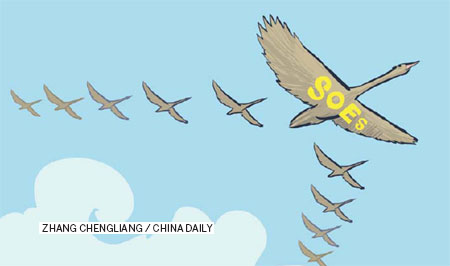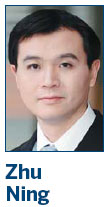Making the tough calls
Updated: 2013-07-12 08:47
By Zhu Ning (China Daily)
|
|||||||||||


China should take steps to maintain the continued influence of State-owned enterprises on growth
The slower pace of economic growth in China during the first six months of the year has once again raised doubts on what will spur growth in the nation during the coming decades. Though there is general consensus that the government must allow the market to play a bigger role in setting the key factory prices and interest rates, there has also been considerable debate on which type of enterprises, state-owned as opposed to privately owned companies, will be more instrumental in helping China change its economic growth model and sustain economic momentum.
At first look, the SOEs have clear advantages. First of all, some of the largest companies in China, measured by total assets and total market capitalization, are SOEs and many of them rank among the largest companies in the world.
Second, some SOEs enjoy monopolistic or oligopolistic power in some industries and there is hardly any competition in sight for them in the near future.
Further, with their strong market power, some SOEs have expanded out of their traditional areas of operation and into more lucrative areas such as real estate development and broadly defined financial services.
However, if history and international lessons serve as useful benchmarks, there are probably more issues than meet the eye. Given the complex objectives of SOEs, profit making has never been an area of expertise for them. Chinese SOEs are no exception to this rule.
Even though the days have passed when the Chinese railway system had its own police system, it remains very common for SOEs to run their own hospitals, middle schools, restaurants and catering businesses.
Because SOEs are expected to do more than bring the best returns to their shareholders, SOE management would inevitably face the challenge of juggling many objectives at the same time. Once profit maximizing is no longer the sole or even the major criterion by which SOEs are to be evaluated, it becomes difficult to measure how they can contribute to Chinese economic growth in the future.
To make things more complex, most of the senior management at SOEs are also part of the civil servant system. Deep down in their hearts, many senior managers at SOEs hold greater political aspirations than commercial objectives.
As a result, such incentives will induce SOE managers to care more about the size of the company than the profits, and more about the speed of growth than the quality. That can be partly reflected by the recent phenomena that almost all of the largest profit losers in the Chinese A-share market are SOEs or subsidiaries of SOEs.
Another important concern that international scholars and policymakers share about SOEs in general is their corporate governance. Because the state is the dominant shareholder, other shareholders may lack the power or incentive to monitor the company and its senior management. The lack of monitoring in SOEs may further lead to governance problems such as corporate empire building, executive compensation and perquisites, tunneling, or even fraud and stock market manipulation.
Separately, some of the largest trading losses in Chinese companies, such as the debacles at China Aviation Oil Corp and Citic Pacific companies, also centered around SOEs. Such incidents again highlight the importance of balancing various stakeholders at SOEs and how SOEs are not particularly good at internal checks and balances.
Therefore, if one were to look around the world, one would find that the trend in SOEs in the past decade has been privatization. By introducing private capital into previously state-owned enterprises, many developed and developing economies, such as Britain, Japan and India, have enjoyed the benefits of letting the market have greater influence on SOEs.
To push the topic a little further, SOEs will eventually face the challenges that the Soviet Union faced before its collapse. Market forces can provide the incentives to find out information that cannot be successfully replicated in a state-controlled environment, while eventually the economy has to operate under its own governing rules.
As a result, even if SOEs can provide much-needed short-term boosts to China's economic growth, the real trillion dollar question may be whether SOEs can sustain their contribution to China's economic growth. And if not, the question also arises as to what would be the best way to reform SOEs.
The author is faculty fellow at the International Center for Finance, Yale University; and deputy director of the Shanghai Advanced Institute of Finance, Shanghai Jiao Tong University. The views do not necessarily reflect those of China Daily.
(China Daily European Weekly 07/12/2013 page11)
Today's Top News
List of approved GM food clarified
ID checks for express deliveries in Guangdong
Govt to expand elderly care
University asks freshmen to sign suicide disclaimer
Tibet gears up for new climbing season
Media asked to promote Sino-Indian ties
Shots fired at Washington Navy Yard
Minimum growth rate set at 7%
Hot Topics
Lunar probe , China growth forecasts, Emission rules get tougher, China seen through 'colored lens', International board,
Editor's Picks

|

|

|

|

|

|





